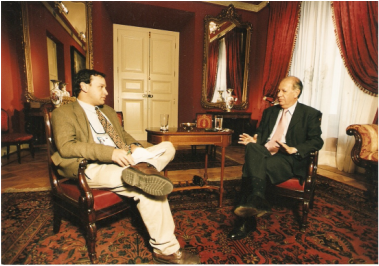journalist, editor, publisher, environment

Jimmy interviewing former Chile President Ricardo Lagos.
Born in New Philadelphia, Ohio, Jimmy Langman grew up in Charlotte, North Carolina, and graduated with a B.A. in History from the University of North Carolina at Chapel Hill. While a student at UNC, he co-founded the national Student Environmental Action Coalition (SEAC) and was chairman of Threshold, SEAC's first national conference. After college, Langman worked four years as director of the Brower Fund and assistant to David Brower, the late environmental leader who founded Friends of the Earth, League of Conservation Voters, and was first executive director of the Sierra Club. During a sabbatical to travel abroad, he accepted a job as coordinator of international projects for Defensores del Bosque Chileno; founded by Adriana Hoffmann, a Chilean botanist and former environmental minister, this now defunct non-profit was Chile's leading organization on forest issues in the 1990s.
A self-taught journalist, his journalism career got its start in October 1998 when Chile's former dictator Augusto Pinochet was arrested in England on human rights crimes. His freelance reporting on the Pinochet case for the San Francisco Chronicle quickly led to regular assignments from that newspaper as well as several other publications, including Newsday, Toronto Globe and Mail, Dallas Morning News, Christian Science Monitor, Miami Herald, Houston Chronicle, and Washington Times. In 2000, Langman was hired by Newsweek magazine as a South America correspondent. For more than a decade, he wrote regularly for the magazine about diverse issues, such as big dams in developing countries, the informal economy in Latin America, indigenous political movements in Latin America, human rights in Chile, and more.
Langman's articles have covered a wide variety of topics, from environment, business and politics to travel and wine. He was a longtime correspondent for EcoAmericas, an international journal on Latin American environment and development issues. He has been a correspondent for wine press such as Decanter and Wine Business International. He has interviewed or done profiles on eight sitting national presidents (Chile, Argentina and Bolivia). His stories have often involved travel to remote areas, such as the Amazon rainforests of eastern Bolivia to investigate conflicts between indigenous groups and gas companies; coca growing areas in the central Chapare region of Bolivia to write about the war on drugs; and the rural Sertao region of Pernambuco, Brazil, to research the devastating effects of desertification. He has done news reporting in conflict zones, such as in June 2005 when he filed daily reports for The Guardian newspaper of London about violent protests over gas privatization policies in Bolivia which nearly caused a civil war and ultimately forced the Bolivian president to resign. He provided on-site news coverage of the February 2010 Chilean earthquake for Global Post, The Independent, Toronto Globe and Mail, and Miami Herald.
He is the co-author of five editions of Fodor's travel guidebooks on Chile and Patagonia (2008, 2010, 2015, 2018, 2022). Langman is author of a 2003 Oxfam America briefing paper on the impacts of a potential WTO International Investment Treaty on extractive industries in developing countries. In 2007, he was awarded the Samuel Chavkin Investigative Journalism Grant to research the global pesticide trade.
Langman currently lives in southern Chile where he works as a freelance journalist and is founder and executive editor of Patagon Journal, an international, bilingual magazine about Chilean and Argentine Patagonia and the world's last wild places.
A self-taught journalist, his journalism career got its start in October 1998 when Chile's former dictator Augusto Pinochet was arrested in England on human rights crimes. His freelance reporting on the Pinochet case for the San Francisco Chronicle quickly led to regular assignments from that newspaper as well as several other publications, including Newsday, Toronto Globe and Mail, Dallas Morning News, Christian Science Monitor, Miami Herald, Houston Chronicle, and Washington Times. In 2000, Langman was hired by Newsweek magazine as a South America correspondent. For more than a decade, he wrote regularly for the magazine about diverse issues, such as big dams in developing countries, the informal economy in Latin America, indigenous political movements in Latin America, human rights in Chile, and more.
Langman's articles have covered a wide variety of topics, from environment, business and politics to travel and wine. He was a longtime correspondent for EcoAmericas, an international journal on Latin American environment and development issues. He has been a correspondent for wine press such as Decanter and Wine Business International. He has interviewed or done profiles on eight sitting national presidents (Chile, Argentina and Bolivia). His stories have often involved travel to remote areas, such as the Amazon rainforests of eastern Bolivia to investigate conflicts between indigenous groups and gas companies; coca growing areas in the central Chapare region of Bolivia to write about the war on drugs; and the rural Sertao region of Pernambuco, Brazil, to research the devastating effects of desertification. He has done news reporting in conflict zones, such as in June 2005 when he filed daily reports for The Guardian newspaper of London about violent protests over gas privatization policies in Bolivia which nearly caused a civil war and ultimately forced the Bolivian president to resign. He provided on-site news coverage of the February 2010 Chilean earthquake for Global Post, The Independent, Toronto Globe and Mail, and Miami Herald.
He is the co-author of five editions of Fodor's travel guidebooks on Chile and Patagonia (2008, 2010, 2015, 2018, 2022). Langman is author of a 2003 Oxfam America briefing paper on the impacts of a potential WTO International Investment Treaty on extractive industries in developing countries. In 2007, he was awarded the Samuel Chavkin Investigative Journalism Grant to research the global pesticide trade.
Langman currently lives in southern Chile where he works as a freelance journalist and is founder and executive editor of Patagon Journal, an international, bilingual magazine about Chilean and Argentine Patagonia and the world's last wild places.
